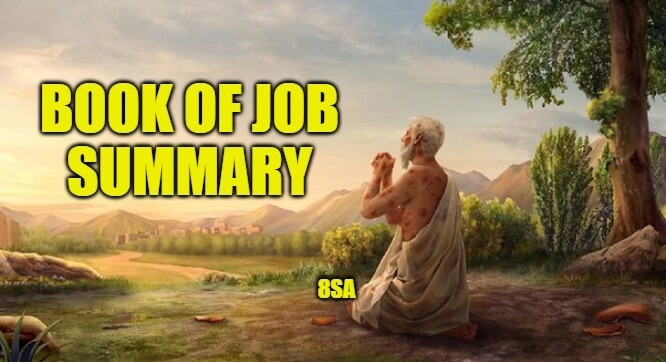What is the Book of Job about? Chapter by chapter detailed summary of Book of Job and information, analysis of Book of Job.

Book of Job
The Book of Job is a book in the Hebrew Bible and the Christian Old Testament. It is considered one of the Wisdom books of the Hebrew Bible and is included in the Ketuvim (“Writings”) section of the Jewish canon. The book is written in the form of a poetic dialogue between Job and his friends, in which Job expresses his despair at the injustice of his suffering, and his friends offer various explanations for it. The book concludes with a vision of God in which God rebukes Job’s friends for their lack of understanding, and speaks of Job’s righteousness. The theme of the book is the problem of theodicy, or the justification of the ways of God to man.
Summary
The Book of Job is one of the most profound and powerful books of the Hebrew Bible, and it has been widely studied and discussed for thousands of years. The book tells the story of Job, a wealthy man who is known for his piety and devotion to God. One day, Satan appears before God and challenges Job’s faith, claiming that Job only worships God because he has been blessed with wealth and prosperity. God allows Satan to test Job by taking away his wealth, his children, and his health, but forbids Satan from taking Job’s life.
Throughout the book, Job struggles to understand why he is being punished and cries out to God for an explanation. His three friends, Eliphaz, Bildad, and Zophar, visit him and offer various explanations for his suffering, including the idea that he must have done something to deserve it. However, Job insists that he is innocent and that his suffering is unjust.
The dialogue between Job and his friends forms the bulk of the book, and it is written in poetry that is rich in imagery and metaphor. The friends offer various explanations for Job’s suffering, including the idea that suffering is a punishment for sin, or that it is a test of faith. However, Job rejects these explanations and insists that his suffering is unjust.
In the end, God speaks to Job out of a whirlwind and rebukes his friends for their false accusations and lack of understanding. God explains that Job’s suffering is not a punishment for his sins, but rather a test of his faith. God also reveals to Job that he cannot fully understand the ways of the Lord and that he should trust in God’s goodness and justice.
The book ends with Job praising God for his wisdom and power, and acknowledging that God’s ways are beyond human understanding. God also restores Job’s health and wealth, and gives him even more children than he had before.
Overall, the book of Job is considered a profound meditation on the problem of evil and the nature of God’s justice. It is also considered as a masterpiece of world literature due to its poetic language, powerful imagery, and profound insights into the human condition.
Chapter by Chapter
The Book of Job is divided into 42 chapters:
Chapter 1: The Prologue: Job is introduced as a wealthy and pious man who is blessed by God. Satan appears before God and challenges Job’s faith, claiming that Job only worships God because he has been blessed with wealth and prosperity. God allows Satan to test Job by taking away his wealth, his children, and his health, but forbids Satan from taking Job’s life.
Chapter 2-3: Job’s First Dialogue with His Friends: Job’s three friends, Eliphaz, Bildad, and Zophar, visit him and offer condolences for his suffering. Job curses the day of his birth and wishes he had never been born.
Chapter 4-14: Job’s Second Dialogue with His Friends: Job’s friends offer various explanations for his suffering, including the idea that suffering is a punishment for sin, or that it is a test of faith. However, Job rejects these explanations and insists that his suffering is unjust.
Chapter 15-21: Job’s Third Dialogue with His Friends: Job continues to protest his innocence and argues that his friends are not speaking the truth.
Chapter 22-31: Job’s Fourth Dialogue with His Friends: Job continues to insist that his suffering is unjust and that his friends are not speaking the truth. He also curses the day of his birth and wishes he had never been born.
Chapter 32-37: Elihu’s Speech: A young man named Elihu speaks up and offers his own explanation for Job’s suffering, arguing that it is a test of faith.
Chapter 38-41: God’s Speech from the Whirlwind: God speaks to Job out of a whirlwind and rebukes his friends for their false accusations and lack of understanding. God explains that Job’s suffering is not a punishment for his sins, but rather a test of his faith.
Chapter 42: Job’s Response to God: Job acknowledges that he has spoken foolishly and repents. God also restores Job’s health and wealth, and gives him even more children than he had before. Job praises God for his wisdom and power and acknowledges that God’s ways are beyond human understanding.